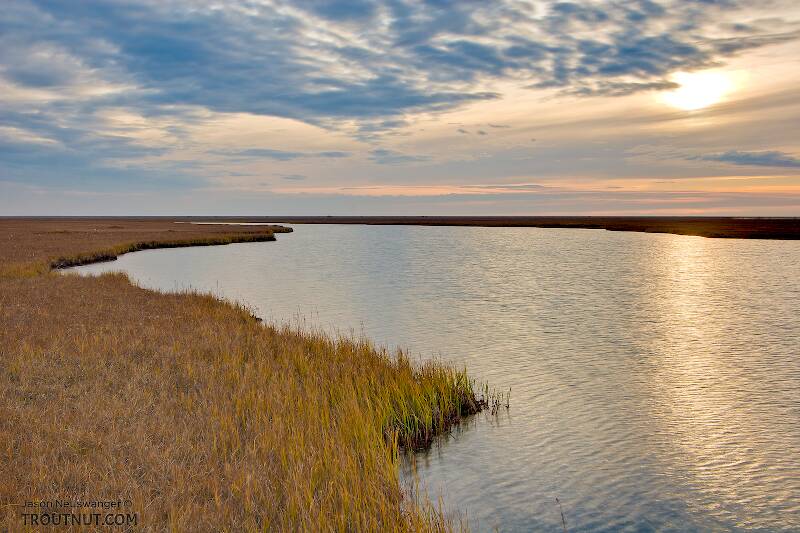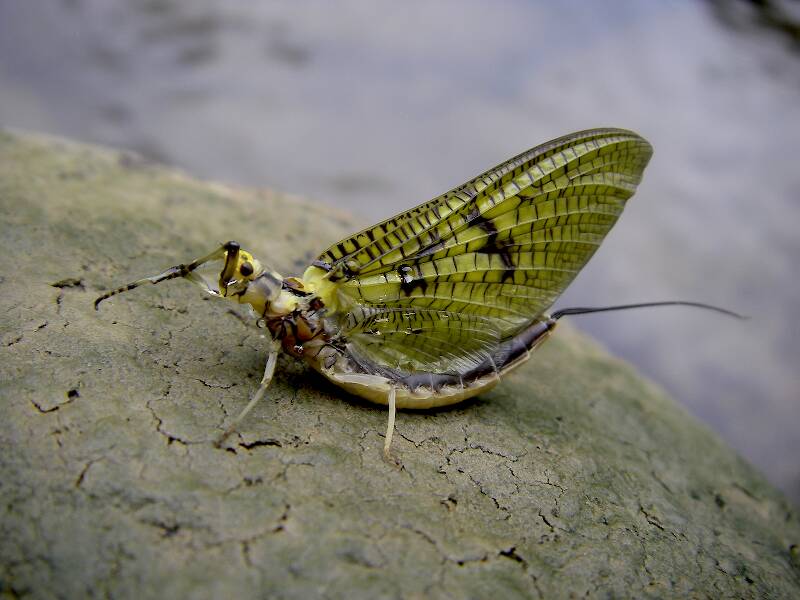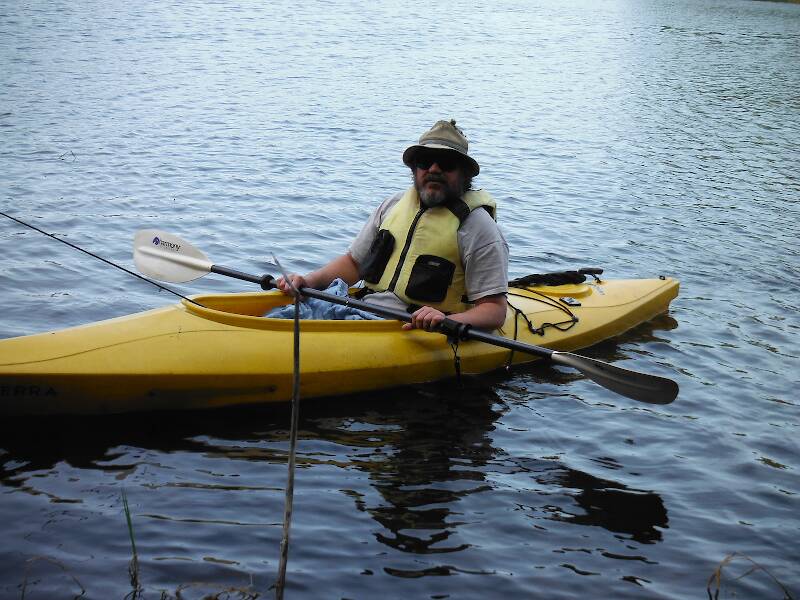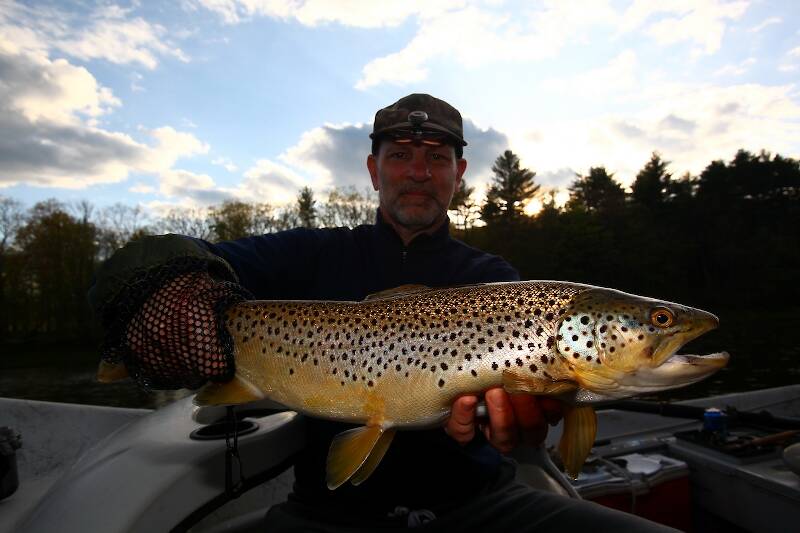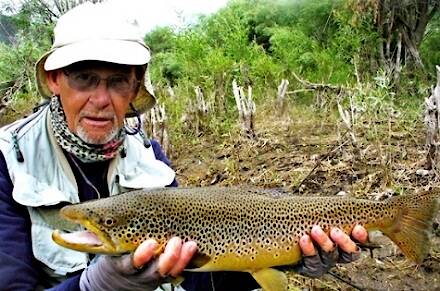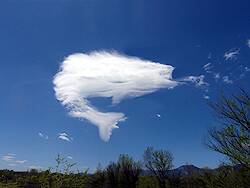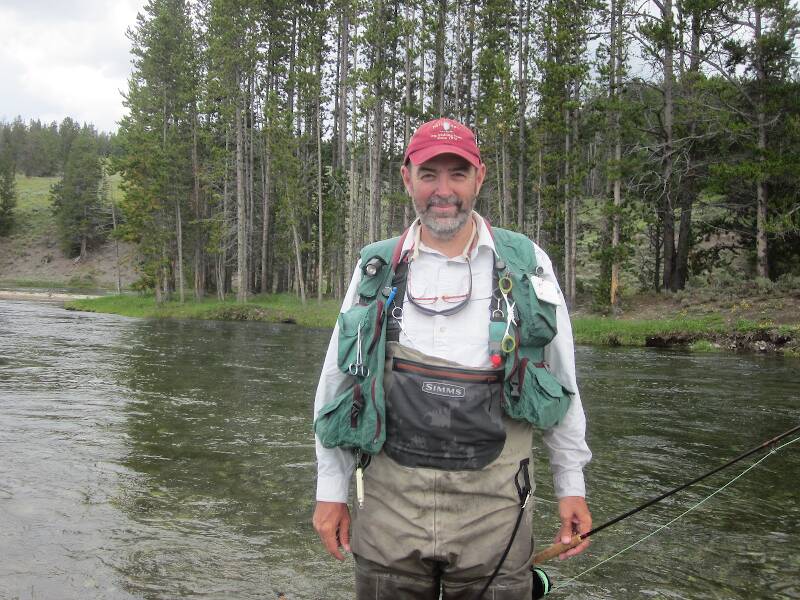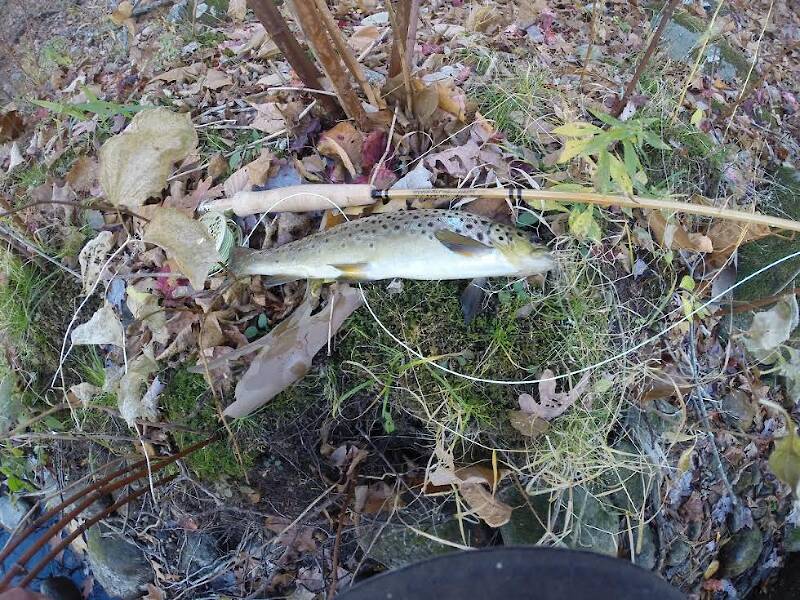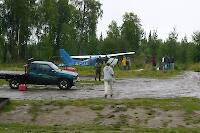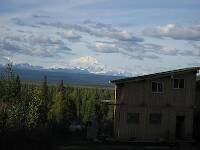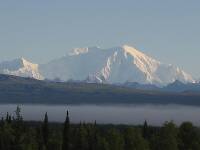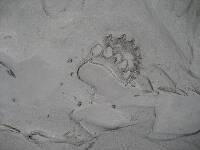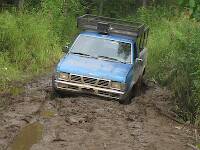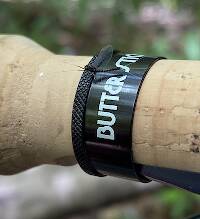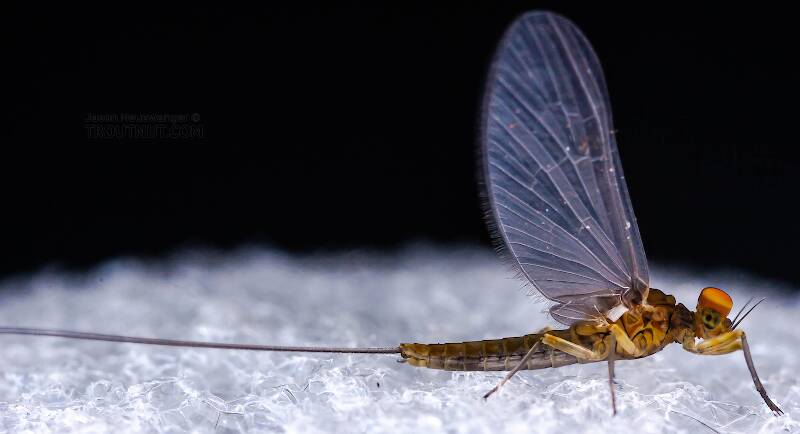
Blue-winged Olives
Baetis
Tiny Baetis mayflies are perhaps the most commonly encountered and imitated by anglers on all American trout streams due to their great abundance, widespread distribution, and trout-friendly emergence habits.
Featured on the forum
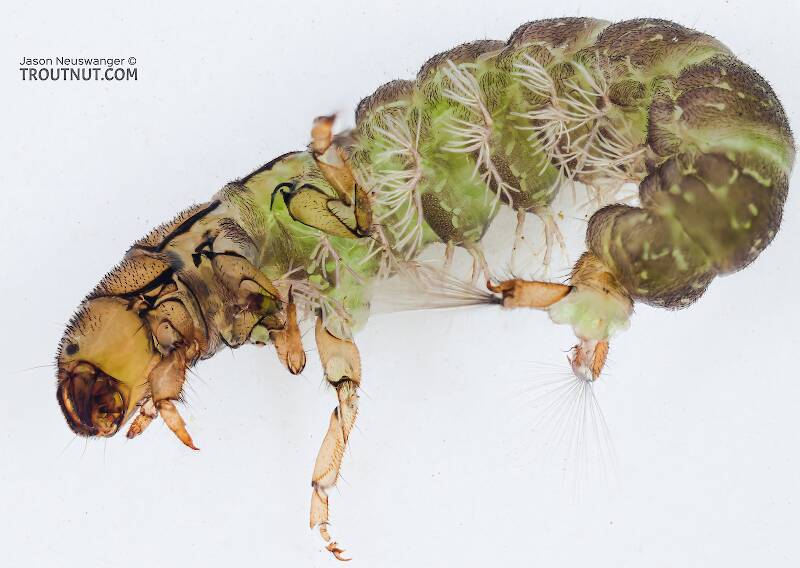
With a bit of help from the microscope, this specimen keys clearly and unsurprisingly to Hydropsyche.

Troutnut is a project started in 2003 by salmonid ecologist Jason "Troutnut" Neuswanger to help anglers and
fly tyers unabashedly embrace the entomological side of the sport. Learn more about Troutnut or
support the project for an enhanced experience here.
By Troutnut on June 23rd, 2016
This post is a continuation from Part I.
Using the same techniques I figured out the previous night, the action in the morning was even hotter. Pools that seemed fishless when nymphing the previous evening came alive.

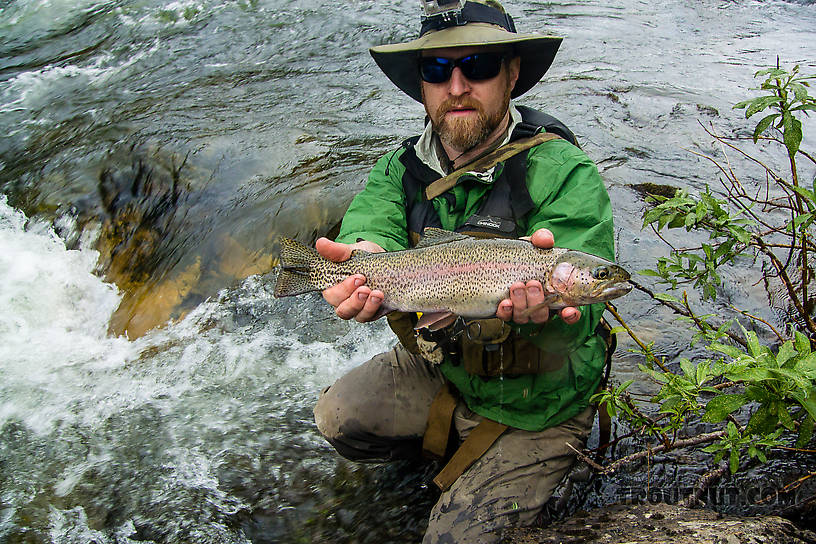
Swinging the streamer through the calmer spots amidst the whitewater brought violent strikes in which big rainbows, flashing silver and red and gold sides, rocketed into the air and cartwheeled back into the river with a big splash. For a brief, beautiful hour, almost every cast drew one of these spectacular strikes.
Hooking fish was the easy part. These were strong, wild, fast-water fish that see a lot of pressure, and they knew what to do when hooked. Every fish I hooked over 20 inches tore off downstream into the maelstrom while I desperately tried to keep up, clamoring over the boulders on the edge of the stream, blocked in by brush on the bank side and whitewater on the other. The drag on my Hardy large arbor reel screamed as these big fish turned their sides to the raging current and shot off toward the ocean. The first few fish wrapped my line up in the rocks or got so far downstream they could easily turn back upstream and spit the hook. I lost the first few big ones.
Finally, one of these fights went my way, and I landed this 21-incher:

A pretty 18-incher soon followed:
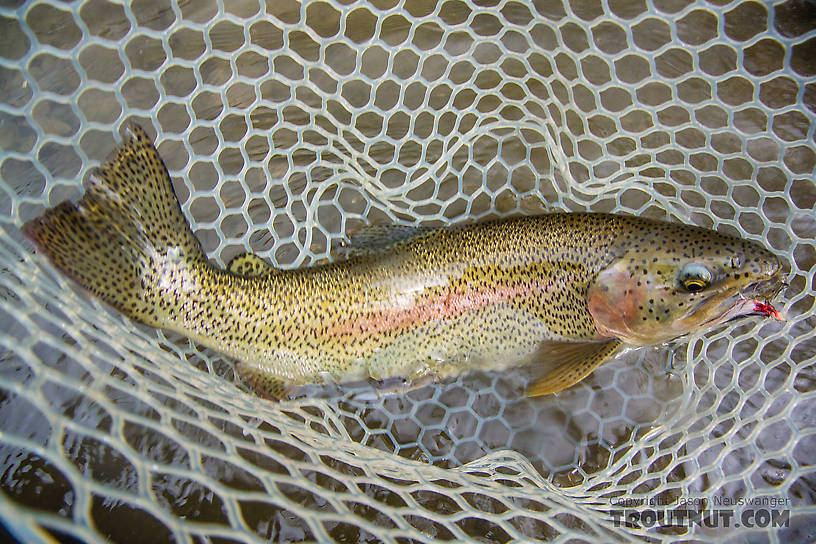
Josh was seeing some action on rainbows, too. But it was hard to communicate over the roar of the whitewater.
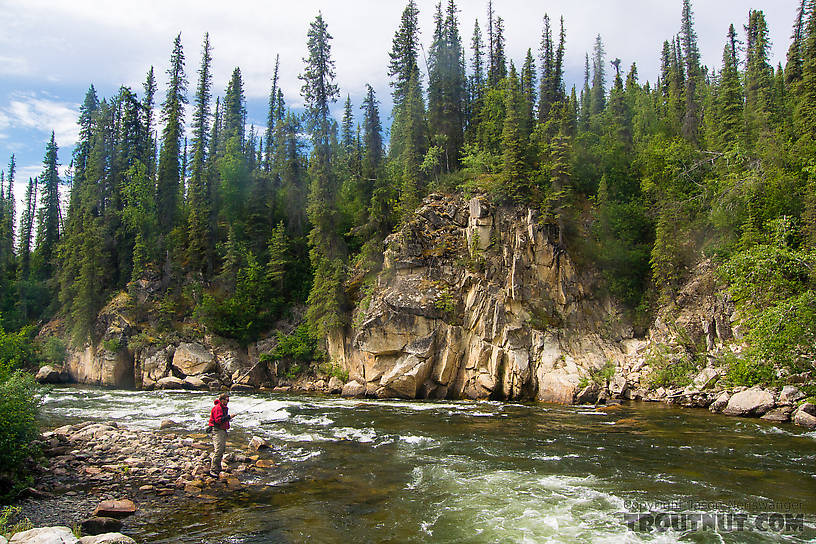
He had never caught a really big trout on the fly, and a main goal of the trip was to get him into one. He had hooked and lost a nice one the night before. Out of pure good luck, I was nearby with the camera when he hooked into a 20-incher in the morning. I wasn't quite close enough to help with the landing net (his was lost to a tree during the hike in), but he skillfully landed it without one:
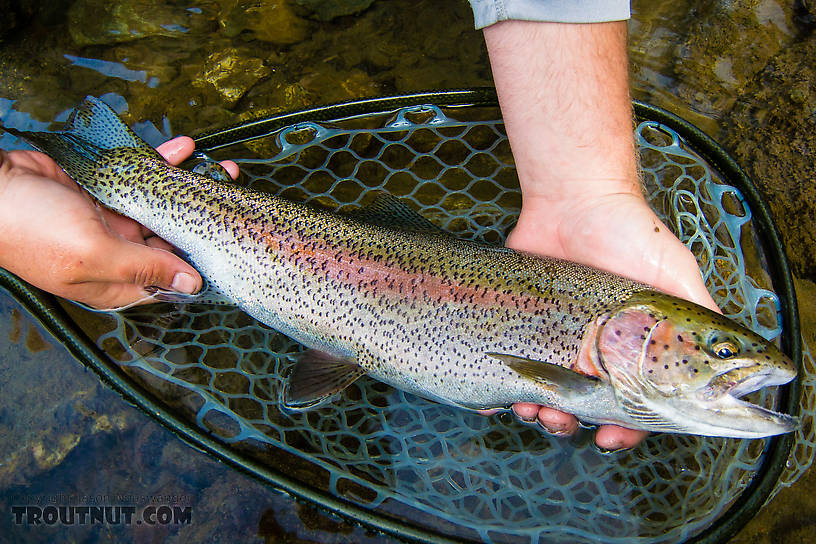
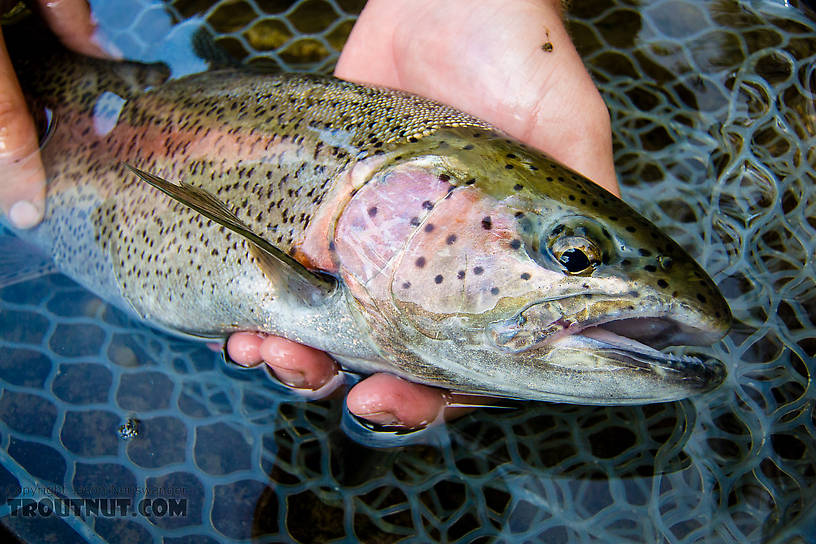
As we reached midday, the action slowed. But there was one spot I knew there were fish I hadn't caught. Earlier I had somehow dropped a fly into the dark water behind the far boulder in the picture below, and a rainbow immediately chased it, but the whitewater in the middle grabbed my line and yanked the fly away.
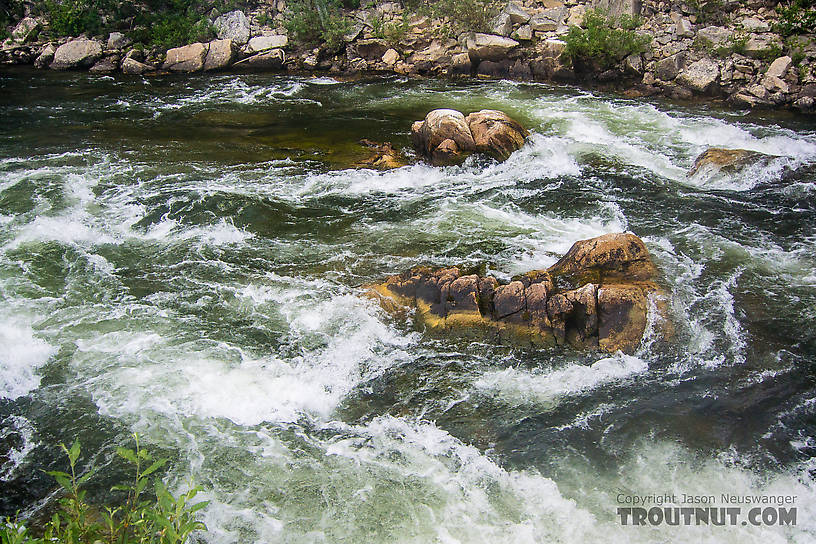
It was about a 75-foot cast, and I've never had much practice casting long distances -- let alone throwing a streamer and split shot with my 5-weight, and obstacles to the backcast. But this would be as good a time as any to learn. I stood atop the rock for probably an hour, working on my technique.
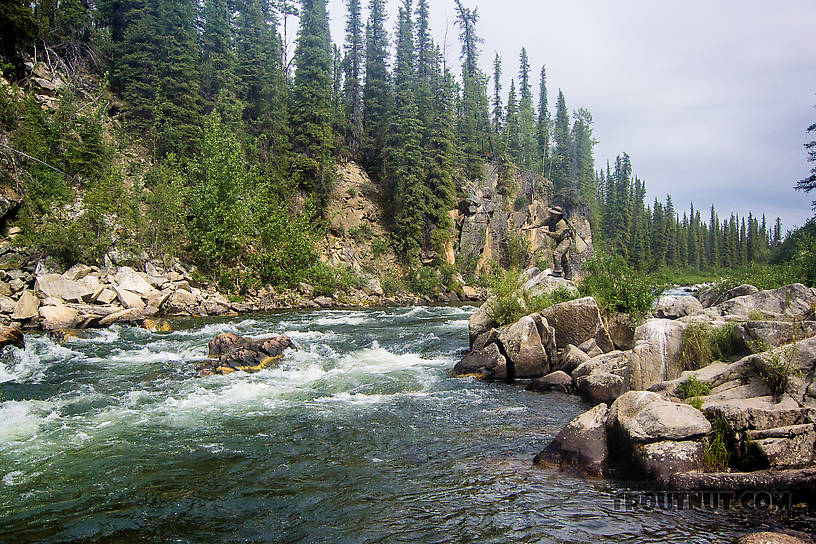
At first, maybe one in every ten or fifteen casts found its mark, and the fly swam through the target zone for a second or two before being ripped out by the current in between. Almost every time it did, the trout chased, and every time they did, they missed, often by the narrowest of margins. The first trout I'd seen in that spot was just a small one, 14 inches or so, but one of the first good repeat attempts drew out a monster. It made multiple follows and even aerial acrobatic attacks on my fly that never quite connected.
Eventually I improved my casting to 1 in 5 or so finding its mark, and I hooked the 14-incher. It fought like a fish twice its weight in the current, and was the most rewarding fish of that size I'd ever landed. Eschewing any chance at easier fish in other pools, I returned to trying for the big one.
After an hour or so, half my casts were landing, and half of those were drawing missed strikes. Finally, I connected! The big rainbow leaped into the air and then shot off into the same fast water that kept me from hooking it for an hour. The few remaining feet of fly line peeled off my reel into the backing, and I jumped down off the boulder to pursue. But I never had a chance. It was a fitting end to this trip that the big fish won the day. But I've never had so much fun losing a fish in my life.
Using the same techniques I figured out the previous night, the action in the morning was even hotter. Pools that seemed fishless when nymphing the previous evening came alive.


Swinging the streamer through the calmer spots amidst the whitewater brought violent strikes in which big rainbows, flashing silver and red and gold sides, rocketed into the air and cartwheeled back into the river with a big splash. For a brief, beautiful hour, almost every cast drew one of these spectacular strikes.
Hooking fish was the easy part. These were strong, wild, fast-water fish that see a lot of pressure, and they knew what to do when hooked. Every fish I hooked over 20 inches tore off downstream into the maelstrom while I desperately tried to keep up, clamoring over the boulders on the edge of the stream, blocked in by brush on the bank side and whitewater on the other. The drag on my Hardy large arbor reel screamed as these big fish turned their sides to the raging current and shot off toward the ocean. The first few fish wrapped my line up in the rocks or got so far downstream they could easily turn back upstream and spit the hook. I lost the first few big ones.
Finally, one of these fights went my way, and I landed this 21-incher:

A pretty 18-incher soon followed:

Josh was seeing some action on rainbows, too. But it was hard to communicate over the roar of the whitewater.

He had never caught a really big trout on the fly, and a main goal of the trip was to get him into one. He had hooked and lost a nice one the night before. Out of pure good luck, I was nearby with the camera when he hooked into a 20-incher in the morning. I wasn't quite close enough to help with the landing net (his was lost to a tree during the hike in), but he skillfully landed it without one:


As we reached midday, the action slowed. But there was one spot I knew there were fish I hadn't caught. Earlier I had somehow dropped a fly into the dark water behind the far boulder in the picture below, and a rainbow immediately chased it, but the whitewater in the middle grabbed my line and yanked the fly away.

It was about a 75-foot cast, and I've never had much practice casting long distances -- let alone throwing a streamer and split shot with my 5-weight, and obstacles to the backcast. But this would be as good a time as any to learn. I stood atop the rock for probably an hour, working on my technique.

At first, maybe one in every ten or fifteen casts found its mark, and the fly swam through the target zone for a second or two before being ripped out by the current in between. Almost every time it did, the trout chased, and every time they did, they missed, often by the narrowest of margins. The first trout I'd seen in that spot was just a small one, 14 inches or so, but one of the first good repeat attempts drew out a monster. It made multiple follows and even aerial acrobatic attacks on my fly that never quite connected.
Eventually I improved my casting to 1 in 5 or so finding its mark, and I hooked the 14-incher. It fought like a fish twice its weight in the current, and was the most rewarding fish of that size I'd ever landed. Eschewing any chance at easier fish in other pools, I returned to trying for the big one.
After an hour or so, half my casts were landing, and half of those were drawing missed strikes. Finally, I connected! The big rainbow leaped into the air and then shot off into the same fast water that kept me from hooking it for an hour. The few remaining feet of fly line peeled off my reel into the backing, and I jumped down off the boulder to pursue. But I never had a chance. It was a fitting end to this trip that the big fish won the day. But I've never had so much fun losing a fish in my life.
Photos by Troutnut from the Gulkana River in Alaska
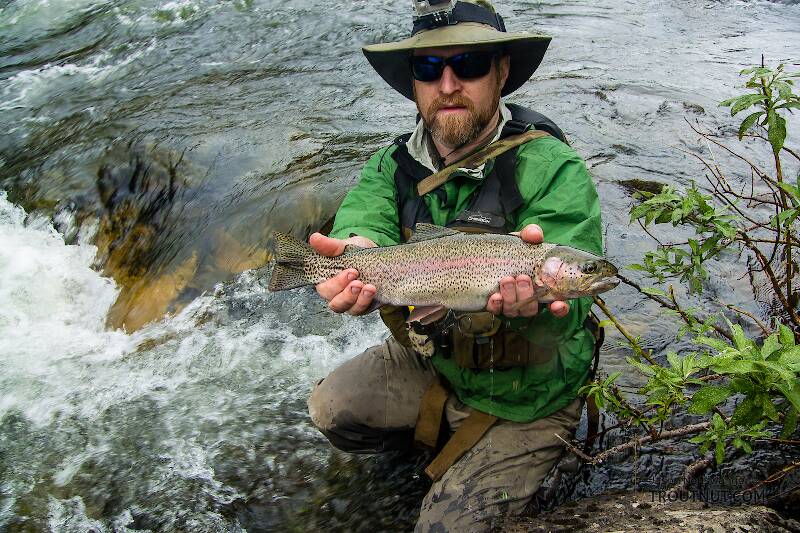
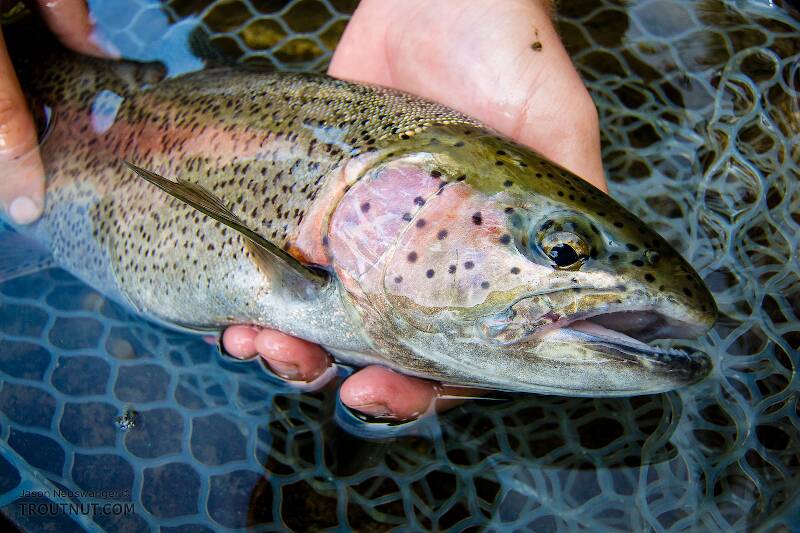
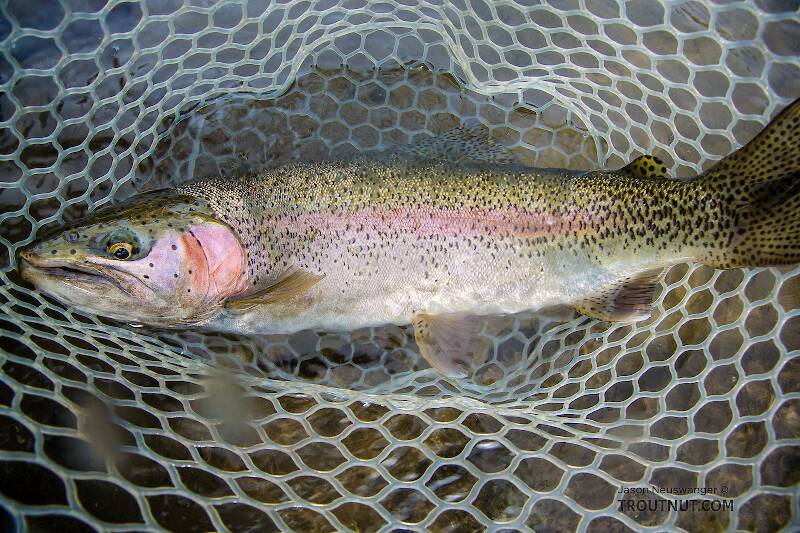
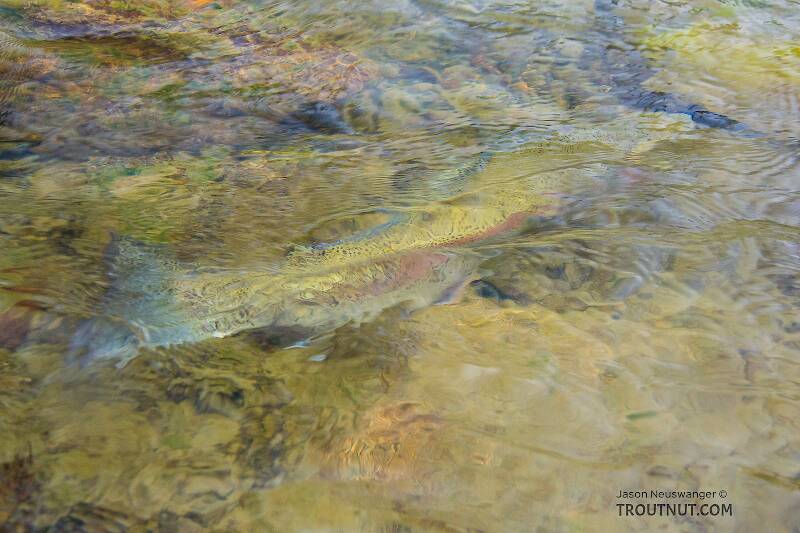
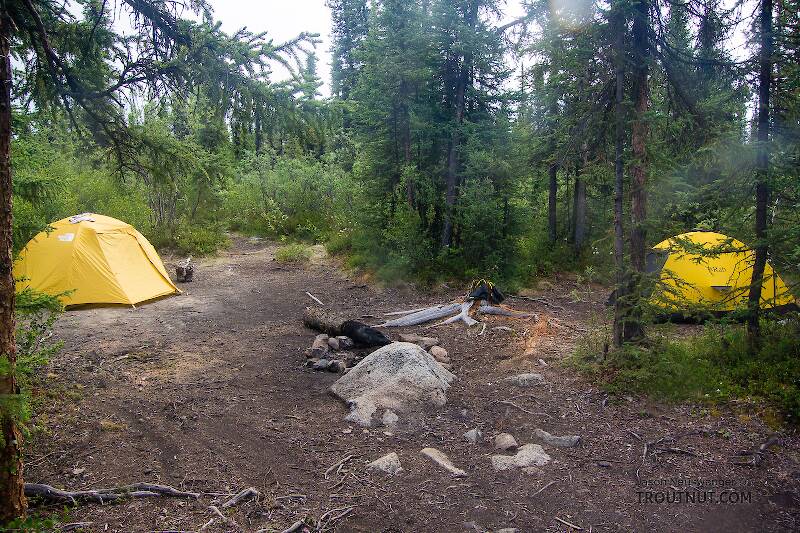
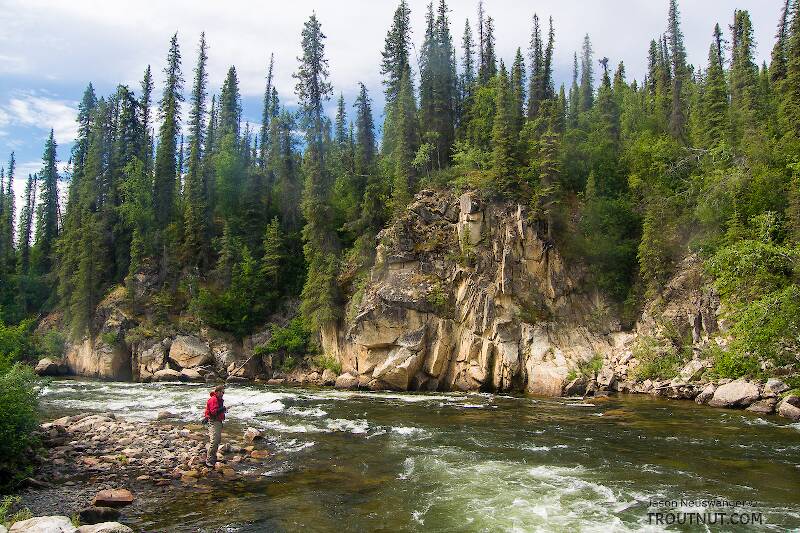
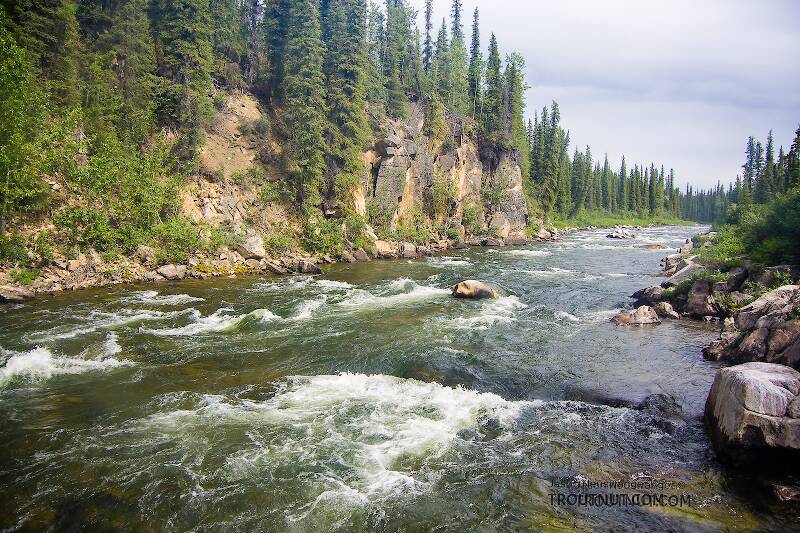
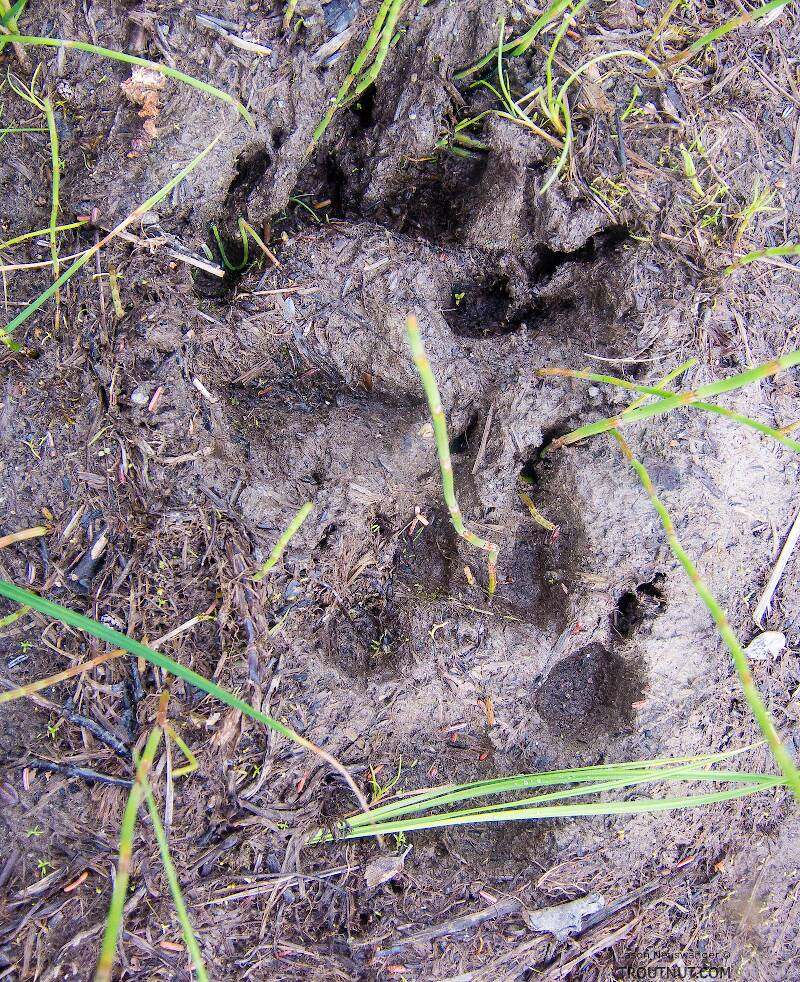
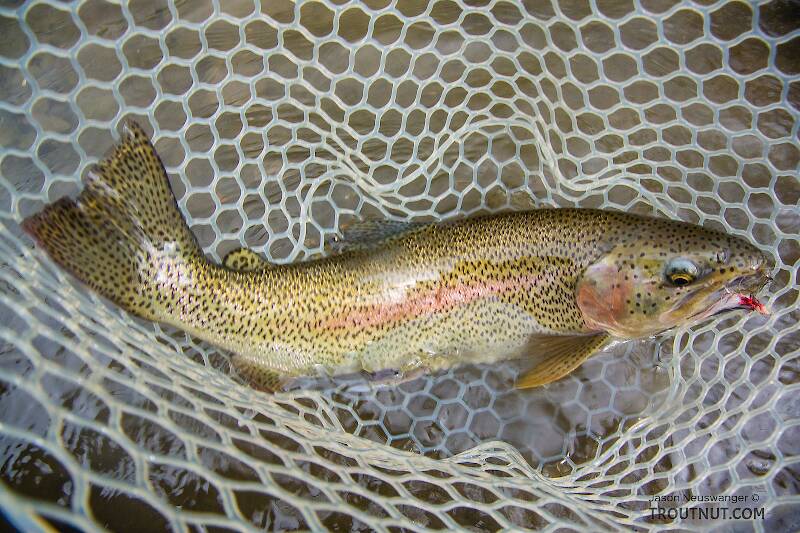
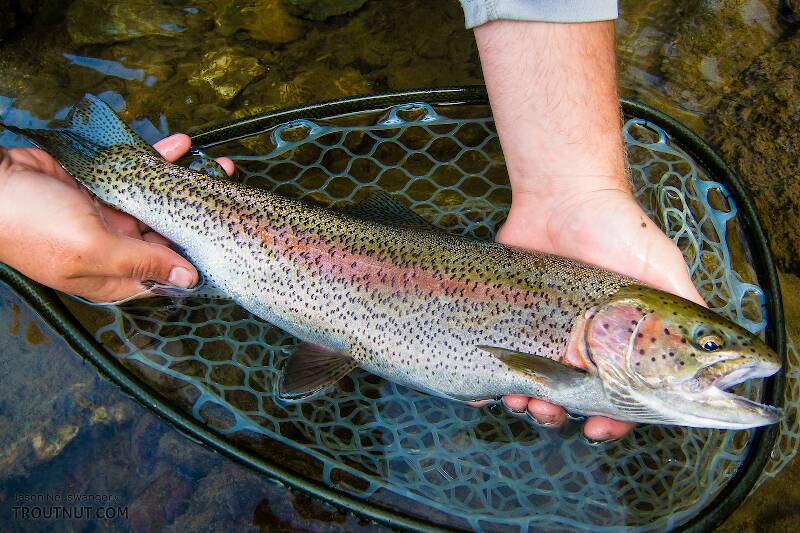
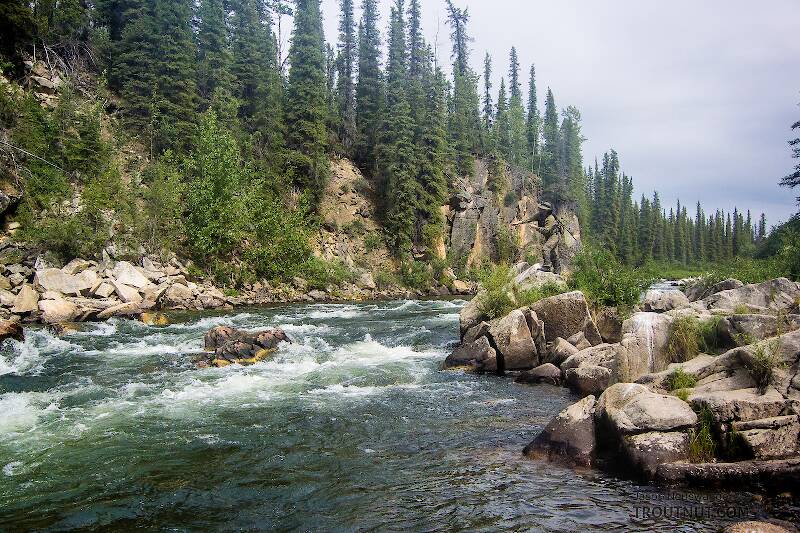
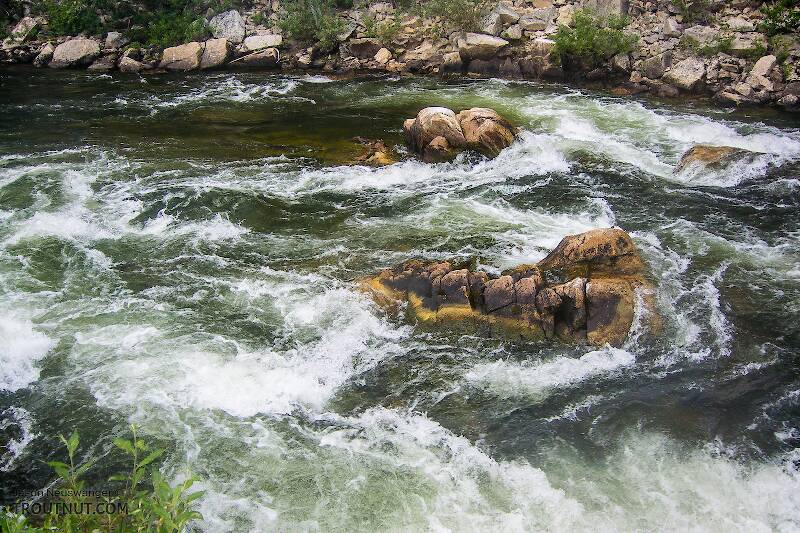
On-stream insect photos by Troutnut from the Gulkana River in Alaska
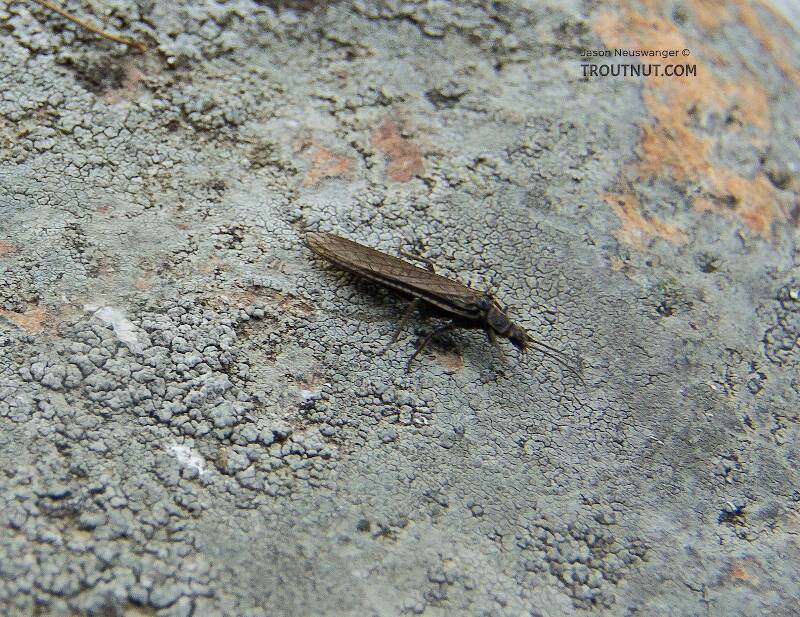
Comments / replies
Crepuscular on Jul 22, 2016July 22nd, 2016, 8:14 am EDT
Nice post Jason as always wonderful photos! interesting water to fish I'm sure.
Jmd123 on Jul 22, 2016July 22nd, 2016, 10:52 am EDT
AWESOME fishing, scenery, and photos, Jason! I love streamer fishing too, and can imagine the JOLT those rainbows sent up your arms and into your brains...it's really quite stimulating! Really pretty fish too, I have been catching tiny (well, up to 9") imitations of those lately, but then again, my waters don't look like yours!
Congrats on excellent fishing and thanks for sharing.
Jonathon
Congrats on excellent fishing and thanks for sharing.
Jonathon
No matter how big the one you just caught is, there's always a bigger one out there somewhere...
Martinlf on Jul 22, 2016July 22nd, 2016, 6:08 pm EDT
Jason, I like the way you figured out what would work. That kind of observation and theorizing is some of the best part of fishing to my mind. Connecting with so many big fish isn't too bad either.
"He spread them a yard and a half. 'And every one that got away is this big.'"
--Fred Chappell
--Fred Chappell
Wbranch on Jul 22, 2016July 22nd, 2016, 9:43 pm EDT
Did you encounter any bears? I'm assuming you have a can of bear spray, or a high power hand gun, on your person whenever you are fishing those remote rivers?
My friend just got back from the Naknek. The fishing was off because the river was about 2' high but the trip included two fly outs. On one fly out my friend, his brother, and the guide encountered a sow grizzly with three cubs. Even the guide said it was a dicey situation. The bear was only about 20' away and for about three minutes it was trying to decide whether to kick their butts or move on. It did move on. The guide had a slug shotgun aimed at the bear just in case. The first round was a rubber bullet, the second round a sabot slug.
On the fly out they caught many dollies to 24" and grayling to 18".
My friend just got back from the Naknek. The fishing was off because the river was about 2' high but the trip included two fly outs. On one fly out my friend, his brother, and the guide encountered a sow grizzly with three cubs. Even the guide said it was a dicey situation. The bear was only about 20' away and for about three minutes it was trying to decide whether to kick their butts or move on. It did move on. The guide had a slug shotgun aimed at the bear just in case. The first round was a rubber bullet, the second round a sabot slug.
On the fly out they caught many dollies to 24" and grayling to 18".
Catskill fly fisher for fifty-five years.
Troutnut on Jul 22, 2016July 22nd, 2016, 10:53 pm EDT
We didn't encounter any bears. The only sign of predators was the wolf tracks. There weren't any easy-to-catch salmon in this area, so nothing to attract bears. We did both have high-powered revolvers, though. My friend has a .454 Casull Ruger Super Redhawk and I have a Smith & Wesson .460.
Sounds like your friend had a good adventure! I haven't had any close calls like that with bears, but I know people who've been charged by grizzlies. (False charge, fortunately.)
Sounds like your friend had a good adventure! I haven't had any close calls like that with bears, but I know people who've been charged by grizzlies. (False charge, fortunately.)
Jason Neuswanger, Ph.D.
Troutnut and salmonid ecologist
Troutnut and salmonid ecologist
Wbranch on Jul 22, 2016July 22nd, 2016, 11:07 pm EDT
Jason wrote;
Well with that kind of firepower you are well prepared for any situation that turns bad. Hopefully that will never happen.
My friend has a .454 Casull Ruger Super Redhawk and I have a Smith & Wesson .460.
Well with that kind of firepower you are well prepared for any situation that turns bad. Hopefully that will never happen.
Catskill fly fisher for fifty-five years.
Jmd123 on Jul 23, 2016July 23rd, 2016, 12:27 am EDT
"...a .454 Casull Ruger Super Redhawk and I have a Smith & Wesson .460"
OUCH!!!
A S&W .44 magnum is quite enough for me, but then again I only have to worry about black bears, not grizzlies...or moose! I have heard that moose are considered to be the most dangerous North American mammal. And that boggy country looks like moose country to me.
So Jason, how would you describe the recoil on those guns? And I think I would go with the 12-guage slugs, if it was convenient to carry a shotgun. Yeah, if I were deep in that country, I'd likely find a way to pack a shotgun...
Jonathon
OUCH!!!
A S&W .44 magnum is quite enough for me, but then again I only have to worry about black bears, not grizzlies...or moose! I have heard that moose are considered to be the most dangerous North American mammal. And that boggy country looks like moose country to me.
So Jason, how would you describe the recoil on those guns? And I think I would go with the 12-guage slugs, if it was convenient to carry a shotgun. Yeah, if I were deep in that country, I'd likely find a way to pack a shotgun...
Jonathon
No matter how big the one you just caught is, there's always a bigger one out there somewhere...
Troutnut on Jul 23, 2016July 23rd, 2016, 1:48 am EDT
And I think I would go with the 12-guage slugs, if it was convenient to carry a shotgun. Yeah, if I were deep in that country, I'd likely find a way to pack a shotgun...
Yeah, 12 gauge slugs are really popular for bear defense up here. I have a Remington 870 Marine Magnum with a pistol grip that I used to carry for that purpose, but I stopped because it was too awkward to carry with my other gear in most situations, let alone at a position ready for a quick draw.
So Jason, how would you describe the recoil on those guns?
My .460? Like trying to catch a baseball bat in your hand mid-swing, while wearing just enough padding not to break anything. If you can picture the kick of a .270 long rifle or so being compressed into a pistol grip, it's about like that. The muzzle energy is similar.
One nice thing about the .460 is you can shoot less severe ammo out of it, including .454 Casull (still kicks, but doesn't leave your hand hurting after 5 shots) and .45 Colt (feels like a .22). I carry the full .460 rounds for bear defense but practice sometimes with the lighter ones. It's a fun gun to shoot with the .45s.
Jason Neuswanger, Ph.D.
Troutnut and salmonid ecologist
Troutnut and salmonid ecologist
Partsman on Jul 23, 2016July 23rd, 2016, 5:08 am EDT
Excellent, thanks for sharing.
Mike
Mike
PaulRoberts on Jul 23, 2016July 23rd, 2016, 7:07 am EDT
Wow. Exciting to watch. Thanks for sharing your adventure, Jason.
Oldredbarn on Jul 23, 2016July 23rd, 2016, 7:31 am EDT
Wonderful post Jason! Nice looking wild trout.
I'm heading towards the West Yellowstone area soon...I found my bear spray canister and was happy to see that it won't expire until next year. :)
In 2013 I came a tad too close to old Scareface at Soda Butte in Yellowstone Park...I had a friend send me a note that someone shot him last Fall...From what I heard he was looking ill and scrawny anyway...The Ranger that pointed him out to me in 2013 said he was around 25 at that time...That's an old bear.
I was getting a little superstitiously concerned...The only bears I have ever seen in the wild were in Yellowstone and they seemed to be getting progressively closer each time.
In 1995 I saw a Black Bear on Mt Washburn a ways off. in 2004 at the Third Meadow of Slough I saw a Grizzly that was a tad too close for this Detroit boy. Then finally in 2013 when I was standing on one side of Soda Butte and the old bear was standing just on the other side of a creek that wasn't much wider than a ditch!
Anyway...Nice post!
Spence
I'm heading towards the West Yellowstone area soon...I found my bear spray canister and was happy to see that it won't expire until next year. :)
In 2013 I came a tad too close to old Scareface at Soda Butte in Yellowstone Park...I had a friend send me a note that someone shot him last Fall...From what I heard he was looking ill and scrawny anyway...The Ranger that pointed him out to me in 2013 said he was around 25 at that time...That's an old bear.
I was getting a little superstitiously concerned...The only bears I have ever seen in the wild were in Yellowstone and they seemed to be getting progressively closer each time.
In 1995 I saw a Black Bear on Mt Washburn a ways off. in 2004 at the Third Meadow of Slough I saw a Grizzly that was a tad too close for this Detroit boy. Then finally in 2013 when I was standing on one side of Soda Butte and the old bear was standing just on the other side of a creek that wasn't much wider than a ditch!
Anyway...Nice post!
Spence
"Even when my best efforts fail it's a satisfying challenge, and that, after all, is the essence of fly fishing." -Chauncy Lively
"Envy not the man who lives beside the river, but the man the river flows through." Joseph T Heywood
"Envy not the man who lives beside the river, but the man the river flows through." Joseph T Heywood
Jmd123 on Jul 23, 2016July 23rd, 2016, 9:44 am EDT
Geez Spence, what's with you and bears? You must not make enough noise in the woods. I'm in bear country pretty often - every time I'm on the Pine at Rearing Pond Road, where I actually saw one four years ago, and at [REDACTED] Pond, where I listened to one grunt his way through the blueberries two years ago. However, not only do I let them know I am there upon arrival, I am generally cussing at the trees that are grabbing my flies so much that I'm sure that keeps them away too. "Man, he sounds like he is not in a good mood, let's avoid him..."
Jason, that's the nicest thing about the magnum calibers, you can always load them with shorter milder rounds. I have a little .327 Federal magnum S&W with a 3" barrel, and with full-powered magnum rounds in what is essentially a pocket pistol, well it can get painful, but you can also get mild little .32 S&W longs to fire in it. I almost never fire .44 specials in my .44 mag, however, because I like that big bang, it is just as much as I can handle and it freaks out others at the range when the fireballs come out of the cylinder gap. Just like I imagine Jason's gun doing, right Jason?
But I digress...that really is killer fishing there Jason, and I'm glad it was worth the rather arduous journey. The latest edition of Fly fisherman has a story about a similar adventure in a saltwater setting that did not end quite so well.
Jonathon
Jason, that's the nicest thing about the magnum calibers, you can always load them with shorter milder rounds. I have a little .327 Federal magnum S&W with a 3" barrel, and with full-powered magnum rounds in what is essentially a pocket pistol, well it can get painful, but you can also get mild little .32 S&W longs to fire in it. I almost never fire .44 specials in my .44 mag, however, because I like that big bang, it is just as much as I can handle and it freaks out others at the range when the fireballs come out of the cylinder gap. Just like I imagine Jason's gun doing, right Jason?
But I digress...that really is killer fishing there Jason, and I'm glad it was worth the rather arduous journey. The latest edition of Fly fisherman has a story about a similar adventure in a saltwater setting that did not end quite so well.
Jonathon
No matter how big the one you just caught is, there's always a bigger one out there somewhere...
Steps25 on Jul 25, 2016July 25th, 2016, 8:19 am EDT
Great post & pics
https://www.youtube.com/channel/UC9EYyyN9n2CwQr-XZClT4bg/
Subscribe, Like, Share, Comments & Feedback Welcome
http://farmingtonriverrodcompany.com/
Subscribe, Like, Share, Comments & Feedback Welcome
http://farmingtonriverrodcompany.com/
TimCat on Jul 26, 2016July 26th, 2016, 3:36 pm EDT
Looks like a great time! In the pic of that 21 inch bow, it looks like the mouth extends back to the eye like a brookie... I'm guessing that's the mouth plate (scientific term - Ha).
"If I'm not going to catch anything, then I 'd rather not catch anything on flies" - Bob Lawless
Quick Reply
Related Discussions
Topic
Replies
Last Reply
0
Jan 11, 2016
by Jadethomaso
by Jadethomaso
3
Jan 2, 2021
by Wbranch
by Wbranch

